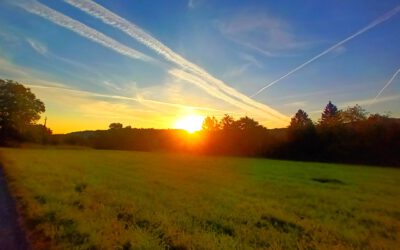creative writing
School, poems and essays – was that always a „very special topic“ for you or is it perhaps still that?
I have always enjoyed reading and writing, even though I know the „natural constraints“ of the school system all too well. I was and still am all the more amazed at how differently the so-called „creative writing“ deals with the writing and design of texts and poems. Since I first came into contact with it at the beginning of 2021, I have been able to make many interesting experiences in different writing workshops and groups, which have changed my view of many things, including my own way of writing.
This starts with the basic idea of „simply writing on it“ on a given impulse (without first „thinking through a topic“) – true to the motto „First impulse equals best impulse“, goes through the intensive experience of one’s own and the external experience of writing in groups and the subsequent reading and ends with the learning of new text or poem forms.
Personally, I like this special way of writing very much now and would like to give you some information about how I understand and got to know the whole thing, because then possibly. some texts that you read from me are better understood or easier to classify according to their structure, form or content.
And who knows, maybe you feel so addressed by it that you would like to try „creative writing“ yourself.
What? You think you can’t do that? Of course you can – it’s very simple:
Sit down, take pen and paper (or as in my case PC, mouse or language program) and let the thoughts that „want to get out“ run wild. I’m sure you’ll be amazed at what great lyrics are created and how much you’ll learn about yourself on this occasion – so: just give it a try …
… and now in a hurry to the so-called „SoPs“ and other strange terminology …
„… and now we write – you know, a SoP“ – when I heard this announcement at my first writing workshop, I only understood „train station“.
„SoP – huh, sounds like soap without „a“, should I write in English now, or what?“ I asked myself.
The explanation for me as a newcomer came immediately:
„SoP – that means writing without a break and is meant to be: Take the pen, write, do not put it down, do not pause, do not read back or correct it, do not let it be disturbed by writer’s blockade, if necessary, ignore this with sentences like: Shit, I can’t think of anything anymore, lalala, there is no such thing as why … , until you’ve got a new writing idea and then simply write, write, write – following the first impulse – until the planned writing time is over and then see what has arisen“ – that’s what the instructor told us to do.
What at first seemed extremely strange to me is now a matter of course for me in the writing times and has become the source of a large number of my texts and poems, which I usually do not change or supplement only insignificantly after I have written them.
Really amazing what this kind of free association, i.e. by starting directly with the writing of a text without a fixed intention, without a goal and without intellectual control of the written, can create for wonderful stories.
A special form of SoPs are the so-called miniatures, which are created as mini-SoPs in very short writing sequences. These usually last only 3-5 minutes and are supplemented by 1 or 2 other miniatures from the same theme, but from a new point of view.
In addition, we CLUSTER, that means free chains of association are formed, starting from a central concept,
Fantasy travel is also used as a stimulus or impulse for inventing one’s own stories, ideas of smells, tastes, weather conditions, colors, places, landscapes or surface structures are used as an association aid. Writing games are used to make stimulating specifications for a text, i. e. by each word used in the text must be monosyllabic or begin with a fixed letter, or by certain fixed words that must necessarily be included in the text. There are Scrabbles, which, based on the game of the same name, represent a special form of the cluster. In addition, serial texts inspire in a special way, in that each sentence has the same – predetermined or free – beginning. As you can see, there are no limits to the imagination when it comes to „creative writing“.
This is also reflected in various forms of poetry, which have nothing at all to do with „classical“ poems, in which verse and rhyming endings play a role.
These exotics include, for example:
HEUTCHEN – DIABOLO – HAIKU – RONDELL – ELFCHEN – ZEVENAAR
My course instructor (greetings at this point 😊) says in detail:
Heutchen:
Short poem with 5 lines
Focus: Self-perception
Split the rows by:
- Today I am … 2. Sensory impression 3rd free movement 4. Sensory impression 5. I …
Example:
Heute bin ich ganz entspannt.
Ich genieße die wärmende Sonne auf meiner Haut.
Für mich könnte ewig Sommer sein.
Die Pollen der Wiesenblumen kribbeln lustig in meiner Nase.
Ich fühle mich wohl mit mir.
Diabolo:
a core term in the middle
5-4-3-2-1-2-3-4-5 words
Example:
Suchen finden gefunden werden Glückseligkeit
Begegnungen Gemeinsamkeiten Auszeiten Liebe
Sehnsüchte Hoffnungen Pläne
Wünsche Träume
Menschen
Ängste Sorgen
Gestern heute morgen
Gier Selbstzweifel Hoffnungslosigkeit Not
Hassen Quälen Krieg Verzweiflung Tod
Haiku:
Japanese short poem
3 lines with 5; 7; 5 syllables
no headline and no rhyme
perceive of what is, of the outer world
Example:
Son-nen-un-ter-gang
Glut-ro-ter-A-bend-him-mel
Die-Nacht-bricht-he-rein
Rondell:
8-line poem
from 5 different sets:
- A 2.B 3.C 4. A 5. E 6. F 7. A 8.B
Example:
Sonnenuntergang am Meer.
Der Himmel brennt.
Muscheln überall im Sand.
Sonnenuntergang am Meer.
Kühles, klares Wasser umspült meine nackten Füße.
Frieden und Ruhe umgeben mich.
Sonnenuntergang am Meer.
Der Himmel brennt.
Elfchen:
11 words in 5 lines:
1st line – 1 word; 2nd line – 2 words; 3rd line – 3 words; 4th line – 4 words;
5th line – 1 word
Example:
Liebe
Suchen finden
Verlieben Vertrauen Verzeihen
Erhofft ersehnt verspielt verloren
Manchmal
ZEVENAAR:
Shape poem – 7 lines (zeven = Dutch: seven)
divided into:
- Place and / or time
- I … + Plot
- a question
- a detail
- Take a closer look at the detail
- Repetition of the 1st line
- Repetition of the 2nd line
Example:
Heute, gestern, morgen, überall und nirgendwo.
Ich und Du, wir gehen zusammen alleine.
Wohin führt der Weg?
Er führt nach oben, unten, links und rechts.
Anfang und Ende liegen in Gottes Hand.
Heute, gestern, morgen, überall und nirgendwo.
Ich und Du, wir gehen zusammen.
All texts used on this and the following pages are protected by copyright. If you want to use these or parts of them, please contact the author – anja@gezittert-gereimt.de –
– texts by Anja Allmanritter, Koblenz
Would you like more examples of all this?
Just look under my „fragments of thought„, under „InConsistencies“ or „Poems„, what you can discover!
By the way, there are now great offers for „creative writing“ at many (elementary) universities and almost everywhere else with private writing coaches … – if I have 😉 aroused your interest in it …
– ANJA ALLMANRITTER –
My Writing Blog
Aktuelles
1. Dortmunder Frauengesundheitstag am 31.08.2024 in Dortmund
Den poetischen Abschluss des 1. Dortmunder Frauengesundheitstag am 31.08.2024 in Dortmund bildeten einige Texte unter dem Motto "gezittert & gereimt". Das Foto von Oliver Schaper zeigt mich im Kreis der übrigen Vortragenden, Organisatoren und weiterer aktiv...
Die Sache mit der Inspiration
Sie ist mir verloren gegangen, meine Inspiration. Und das vor Tagen schon. Wann und wie es dazu kam, das ich - beim besten Willen - nicht sagen kann. Eben noch da, war sie plötzlich verschwunden. Klammheimlich und noch habe ich nicht herausgefunden, wohin es sie...
Zeit loszulassen und festzuhalten
Es ist Zeit Zeit loszulassen Zeit festzuhalten Zeit loszulassen durch Festhalten Zeit festzuhalten durch Loslassen Zeit für das eine oder das andere Zeit manchmal auch für beides zusammen Es ist Zeit Zeit beiden Zeit und Raum im Leben zuzugestehen Bei jedem...



